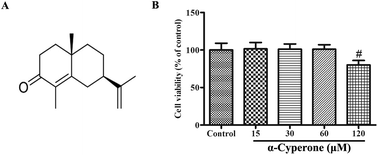当前位置:
X-MOL 学术
›
Food Funct.
›
论文详情
Our official English website, www.x-mol.net, welcomes your
feedback! (Note: you will need to create a separate account there.)
α-Cyperone inhibits LPS-induced inflammation in BV-2 cells through activation of Akt/Nrf2/HO-1 and suppression of the NF-κB pathway
Food & Function ( IF 5.1 ) Pub Date : 2018-03-29 00:00:00 , DOI: 10.1039/c8fo00057c Bingxu Huang 1, 2, 3, 4 , Dewei He 1, 2, 3, 4 , Guangxin Chen 1, 2, 3, 4 , Xin Ran 1, 2, 3, 4 , Wenjin Guo 1, 2, 3, 4 , Xingchi Kan 1, 2, 3, 4 , Wei Wang 1, 2, 3, 4 , Dianfeng Liu 1, 2, 3, 4 , Shoupeng Fu 1, 2, 3, 4 , Juxiong Liu 1, 2, 3, 4
Food & Function ( IF 5.1 ) Pub Date : 2018-03-29 00:00:00 , DOI: 10.1039/c8fo00057c Bingxu Huang 1, 2, 3, 4 , Dewei He 1, 2, 3, 4 , Guangxin Chen 1, 2, 3, 4 , Xin Ran 1, 2, 3, 4 , Wenjin Guo 1, 2, 3, 4 , Xingchi Kan 1, 2, 3, 4 , Wei Wang 1, 2, 3, 4 , Dianfeng Liu 1, 2, 3, 4 , Shoupeng Fu 1, 2, 3, 4 , Juxiong Liu 1, 2, 3, 4
Affiliation

|
Accumulating evidence has shown that activated microglia cause inflammatory immune response, which could lead to neurodegenerative diseases such as Parkinson's disease and Alzheimer's disease. α-Cyperone, one of the main ingredients of Cyperus rotundus oil, has been reported to possess anti-inflammatory activity in activated macrophages. In this study, we found that α-cyperone markedly decreased the production of tumor necrosis factor-α (TNF-α), interleukin-6 (IL-6) and interleukin-1β (IL-1β) in LPS-induced BV-2 cells. Moreover, α-cyperone inhibited NF-κB activation and enhanced heme oxygenase-1 (HO-1), nuclear factor-E2-related factor 2 (Nrf2) and Akt expression. Furthermore, we found that α-cyperone could upregulate HO-1 expression and enhance nuclear translocation of Nrf2 via activating the Akt signaling pathway, and inhibition of Akt, Nrf2 or HO-1 attenuated LPS-induced expression of proinflammatory cytokines in BV-2 cells. Moreover, the toxicities of conditioned medium from activated microglia toward dopaminergic neuronal SH-SY5Y cells and hippocampal neuronal HT22 cells were significantly inhibited by pretreatment with α-cyperone. Taken together, our results indicate that α-cyperone exerts neuroprotective effects by inhibiting the production of inflammatory cytokines in BV-2 cells through activating Akt/Nrf2/HO-1 and suppressing the NF-κB pathway.
中文翻译:

α-Cyperone通过激活Akt / Nrf2 / HO-1和抑制NF-κB途径抑制LPS诱导的BV-2细胞炎症
越来越多的证据表明,活化的小胶质细胞会引起炎症性免疫反应,从而可能导致神经退行性疾病,例如帕金森氏病和阿尔茨海默氏病。据报道,香附子油的主要成分之一-香兰素在活化的巨噬细胞中具有抗炎活性。在这项研究中,我们发现α-香芹酮可明显降低LPS诱导的BV-2中肿瘤坏死因子-α(TNF-α),白细胞介素6(IL-6)和白细胞介素1β(IL-1β)的产生。细胞。此外,α-CYPERONE抑制NF-κB活化并增强血红素加氧酶-1(HO-1),核因子-E2相关因子2(Nrf2)和Akt表达。此外,我们发现α-香芹酮可以通过以下途径上调HO-1表达并增强Nrf2的核转运:激活Akt信号通路,并抑制Akt,Nrf2或HO-1减弱了LPS诱导的BV-2细胞中促炎细胞因子的表达。此外,用α-Cyperone预处理显着抑制了活化的小胶质细胞产生的条件培养基对多巴胺能神经元SH-SY5Y细胞和海马HT22细胞的毒性。两者合计,我们的结果表明,α-Cyperone通过激活Akt / Nrf2 / HO-1和抑制NF-κB途径来抑制BV-2细胞中炎性细胞因子的产生,从而发挥神经保护作用。
更新日期:2018-03-29
中文翻译:

α-Cyperone通过激活Akt / Nrf2 / HO-1和抑制NF-κB途径抑制LPS诱导的BV-2细胞炎症
越来越多的证据表明,活化的小胶质细胞会引起炎症性免疫反应,从而可能导致神经退行性疾病,例如帕金森氏病和阿尔茨海默氏病。据报道,香附子油的主要成分之一-香兰素在活化的巨噬细胞中具有抗炎活性。在这项研究中,我们发现α-香芹酮可明显降低LPS诱导的BV-2中肿瘤坏死因子-α(TNF-α),白细胞介素6(IL-6)和白细胞介素1β(IL-1β)的产生。细胞。此外,α-CYPERONE抑制NF-κB活化并增强血红素加氧酶-1(HO-1),核因子-E2相关因子2(Nrf2)和Akt表达。此外,我们发现α-香芹酮可以通过以下途径上调HO-1表达并增强Nrf2的核转运:激活Akt信号通路,并抑制Akt,Nrf2或HO-1减弱了LPS诱导的BV-2细胞中促炎细胞因子的表达。此外,用α-Cyperone预处理显着抑制了活化的小胶质细胞产生的条件培养基对多巴胺能神经元SH-SY5Y细胞和海马HT22细胞的毒性。两者合计,我们的结果表明,α-Cyperone通过激活Akt / Nrf2 / HO-1和抑制NF-κB途径来抑制BV-2细胞中炎性细胞因子的产生,从而发挥神经保护作用。











































 京公网安备 11010802027423号
京公网安备 11010802027423号